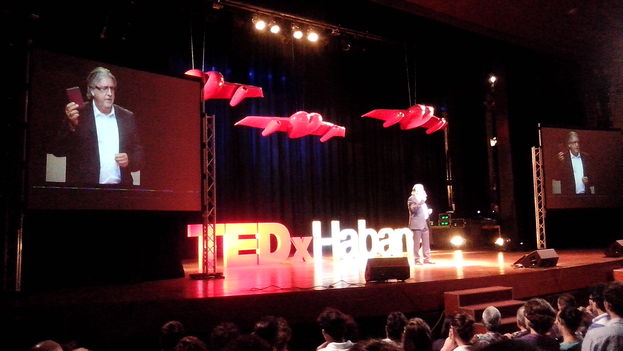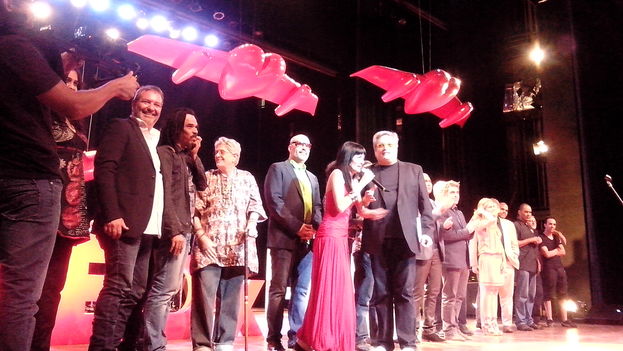
For some time, TEDx Havana had been cooking. Those of us who for years have followed the trail of this event, which mixes science, art, design, politics, education, culture and much ingenuity, were counting the days until we could hear on our national stages its stories of entrepreneurship, progress and creativity. Finally, that day arrived, to the gratification of many and the dissatisfaction of many others.
TED is a non-profit organization founded 25 years ago in California, which is an acronym for Technology, Entertainment and Design. Its annual conference has become a feast of ideas and proposals, while the famous “TED Talks” provide a microphone to speakers who inspire their listeners to take on new projects. These talks have, over time, been sneaked into the alternative information networks in Cuba, and they have sparked a desire among the public to see these screen personalities in-person, in the here and now.
For these reasons, there was great anticipation at the news of the imminent landing in our city of that independent – and equally inspiring – part of TED, which is TEDx. The event, named InCUBAndo [“InCUBAting”], took place in the Covarrubias Hall of the National Theatre this past Saturday afternoon. Among the organizers credited in the printed program were the singer Cucú Diamante, the actor Jorge Perugorría, and Andrés Levin, music producer.
We almost did not learn of the arrival of TEDx until 24 hours prior to the curtains being drawn back at the National Theatre.
So, yes, the arrival of this program was literally a landing. The set design in the hall included some little allegorical pink airplanes – the meaning of which many in the audience wondered about – but which turned out to be part of a plastic art installation. Besides which, we almost did not learn of the arrival of TEDx until 24 hours prior to the curtains being drawn back at the National Theatre.
Some flyers distributed at the University of Havana and around the La Rampa cinema last Friday were the first signs to the Havana public that TEDx would arrive in our capital city. Actually, prior to this, the British ambassador to Cuba, Tim Cole, had already announced it on Twitter – but the news only got through to those with Internet access – of which there are very few in this “disconnected city.”
Regardless, as long as we could have TEDx, we were ready to forgive all: the haste of the arrangements, the lack of advertising, and even the “secrecy.” If the event had to occur under these conditions, well, so be it. At any rate, hundreds of Cubans arrived at the scene to hear these exceptional people who were here to tell us their life stories. One of the best presentations was the one titled “Borders Without Borders,” by the diplomat Herman Portocarrero, European Union representative in Cuba.

The energy in the X Alfonso Hall could be felt also from Portocarrero’s story of the birth and first steps of the Cuban Art Factory. Meanwhile the founder of the famous La Guarida restaurant tackled the difficult but gratifying path of the entrepreneur. As host, a dynamic and subtly humorous Amaury Pérez was a good link betweeb some parts of the program. Missing, however, were the voices – further away from the worlds of show business and diplomacy – of others whose ingenuity helps them to survive every day, negotiate the commonplace difficulties, and unbuckle themselves from the straightjacket of our reality.
I do not know the process that was employed to select speakers for TEDx Havana, but what I saw on the stage left me a taste of incompleteness and partiality. The dance music seemed intended to fill those voids and distract an audience that mainly had come to hear anecdotes, testimonies and life stories.
Some of the guest speakers politicized the proceedings, favoring, of course, the official line.
The worst moment was without a doubt the segment of extemporaneous versifiers Tomasita and Luis Paz – who in the middle of their improvisations sang praises to the five Cuban spies, of which three are still in prison in the United States. Up until that moment, many of us accepted the rules of TEDx Havana. Faced with the evident absences at those microphones, I believe that we had convinced ourselves that “it was all right that spaces not be politicized that way.” However, as it turned out, some of the guest speakers politicized the proceedings – favoring, of course, the official line.
Even with all the shambles, TEDx Havana leaves a good taste in the mouth – at the least a feeling that there are people not only with much to tell, but with expressiveness and composure in telling it before hundreds of attentive eyes. The experiences of this first edition will serve to better the second opportunity this event will have to take place among us.
If the organizers are open to suggestions for future TEDx events, it would be good to emphasize better and greater promotion prior to this feast of creativity and entrepreneurship. In addition, let us have transparency in the process of selecting the speakers, so that they may compete and audition in advance, from those who have created a small cottage industry of homemade preserves, to even those who, with ingenuity, laugh at censorship or dream of a Cuba where success in accomplishment is not something extraordinary, but commonplace.
Translated by: Alicia Barraqué Ellison
